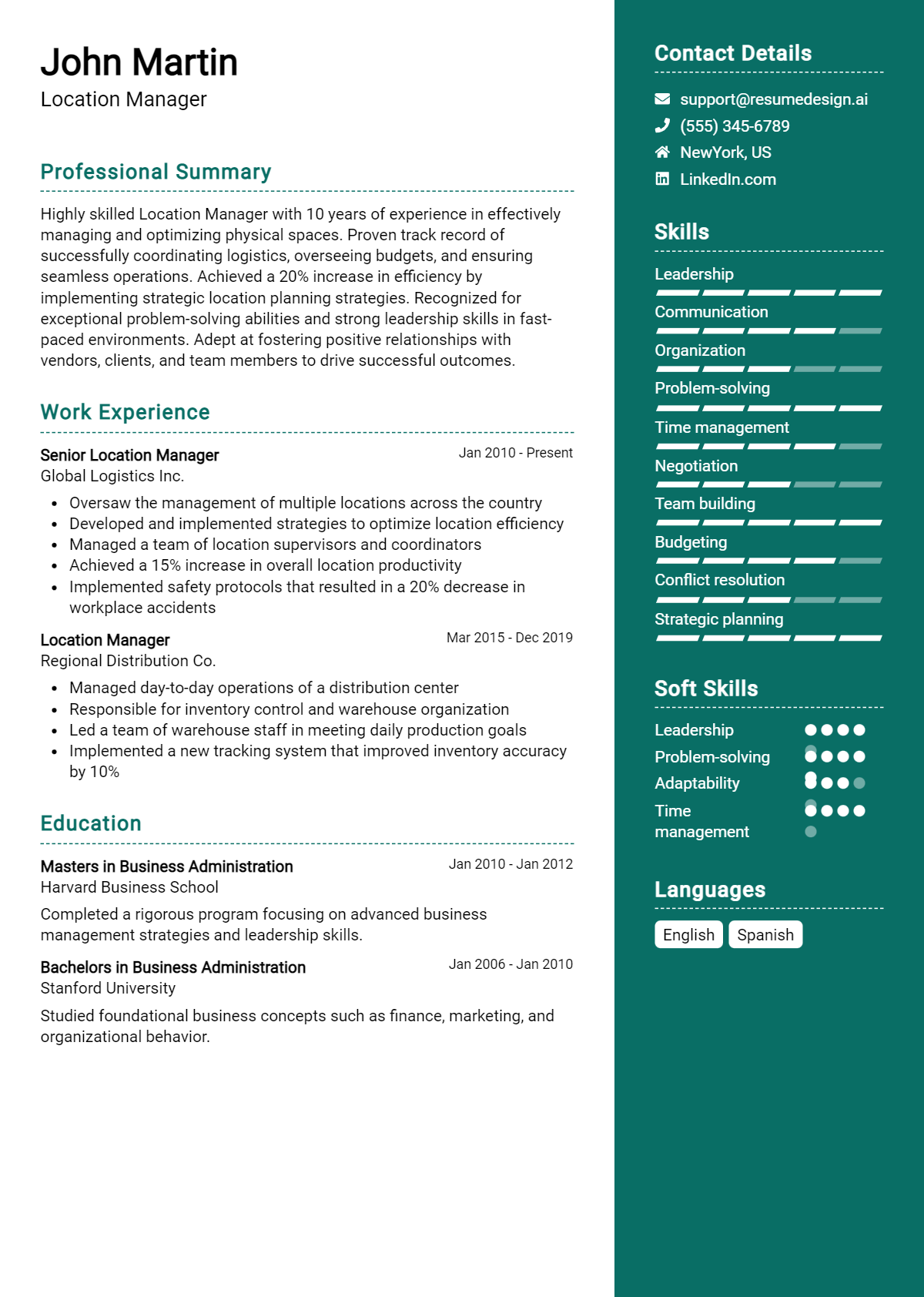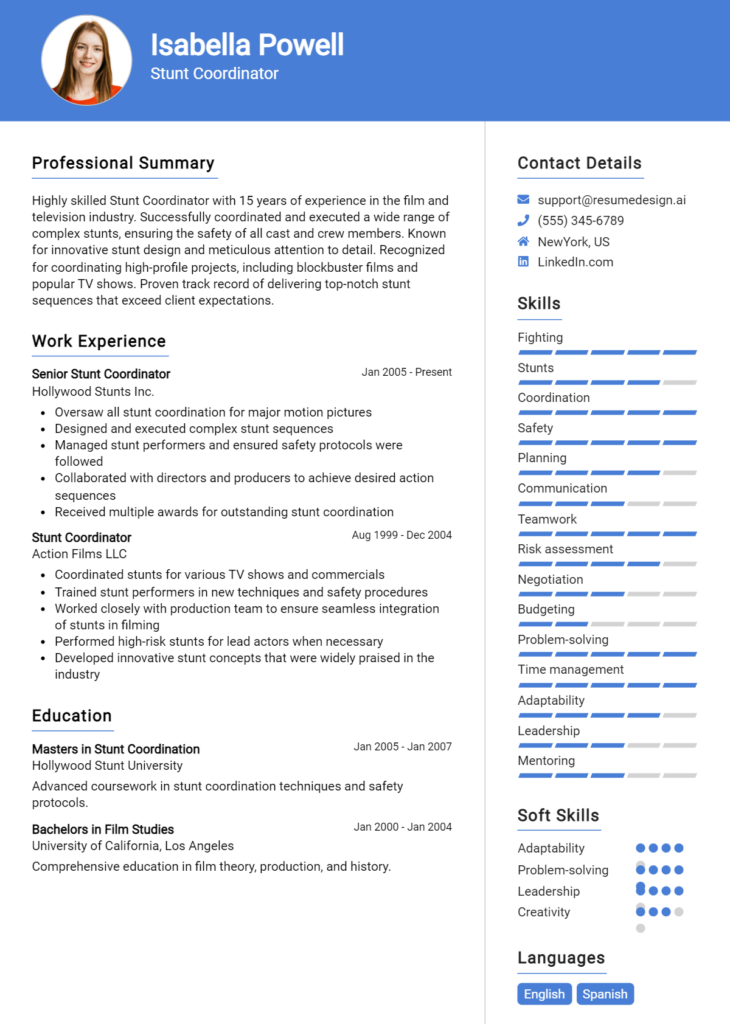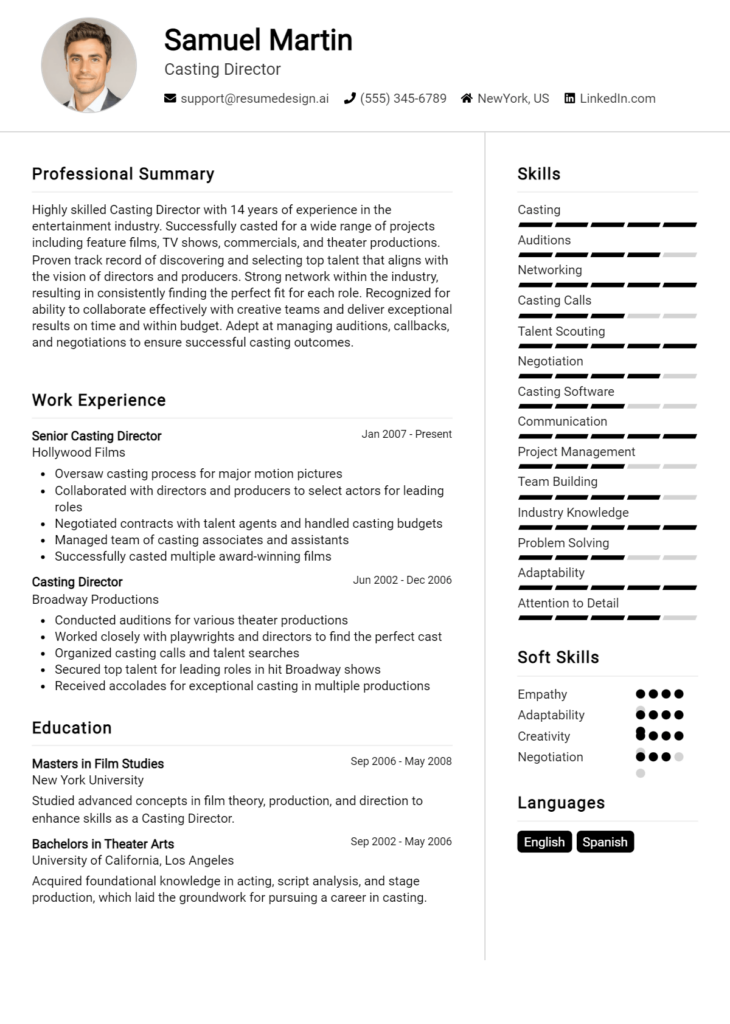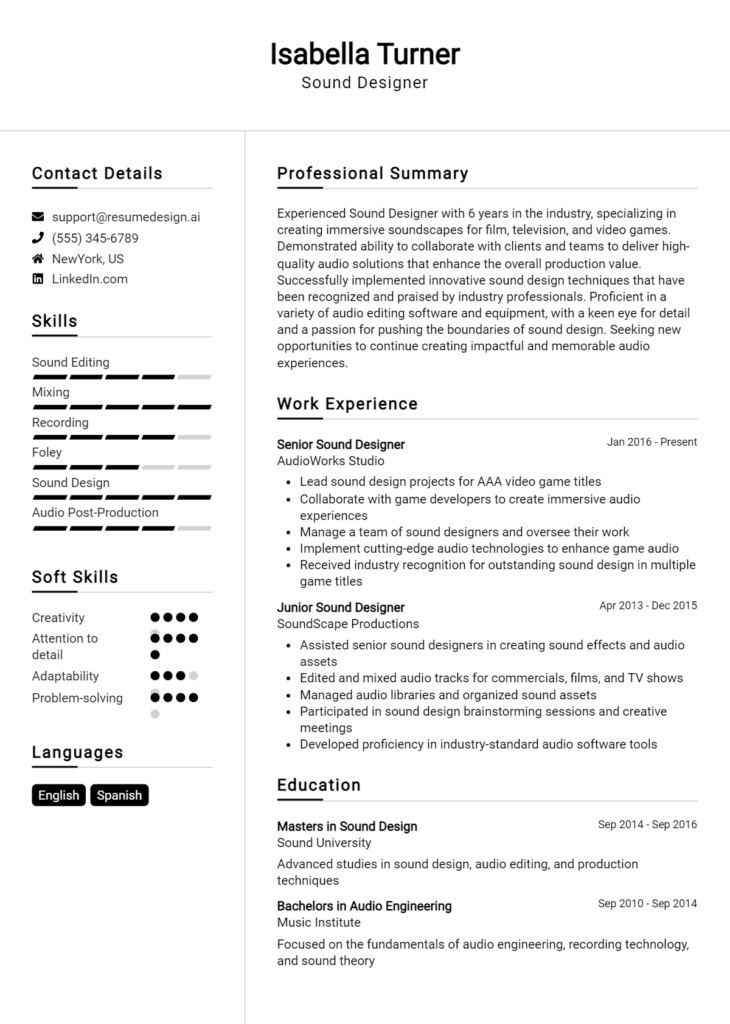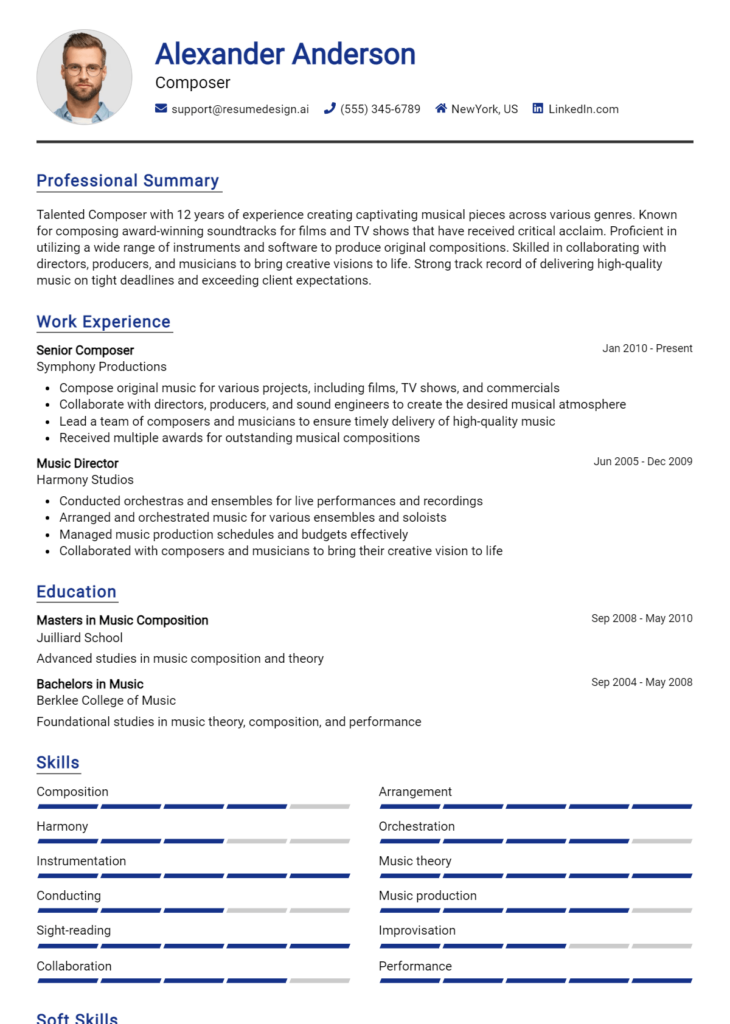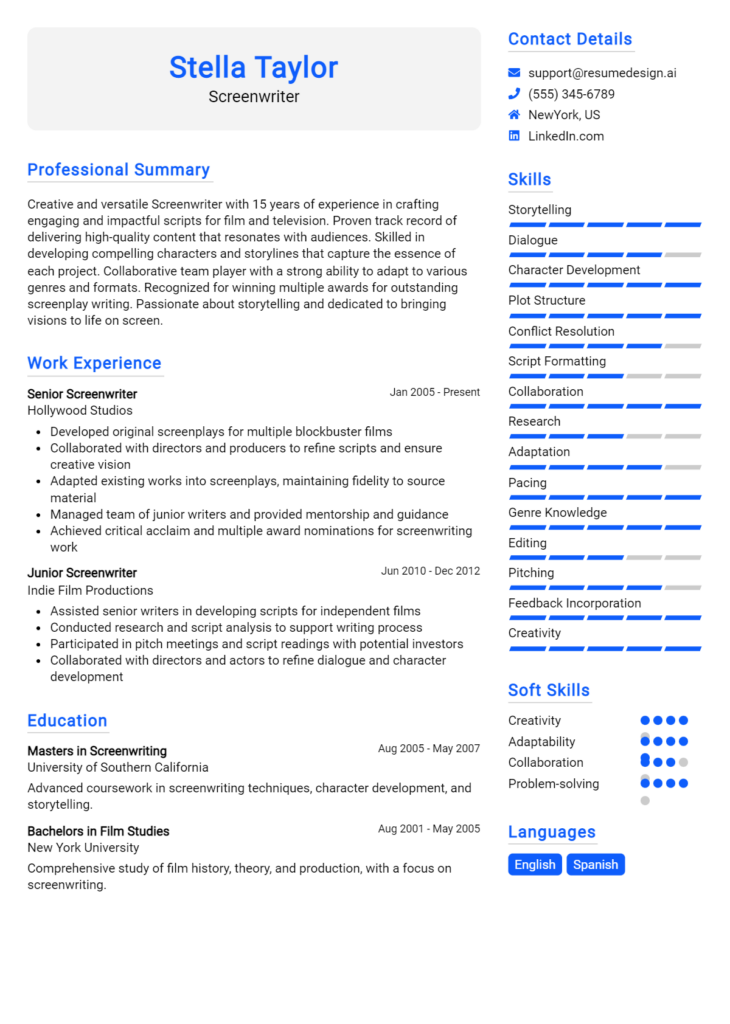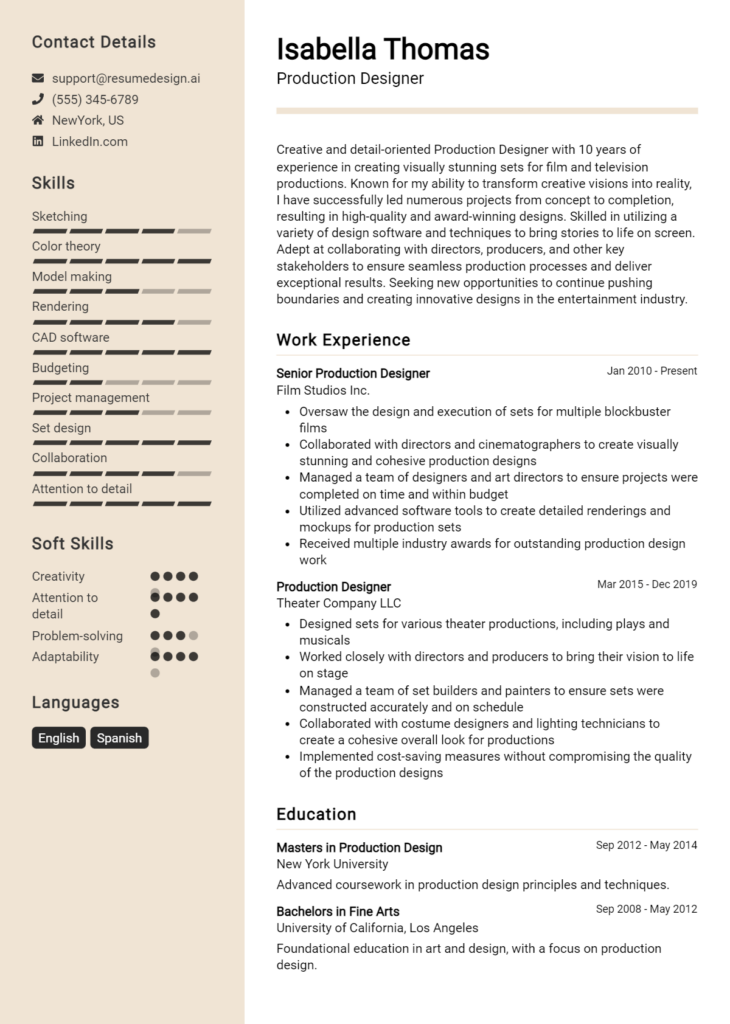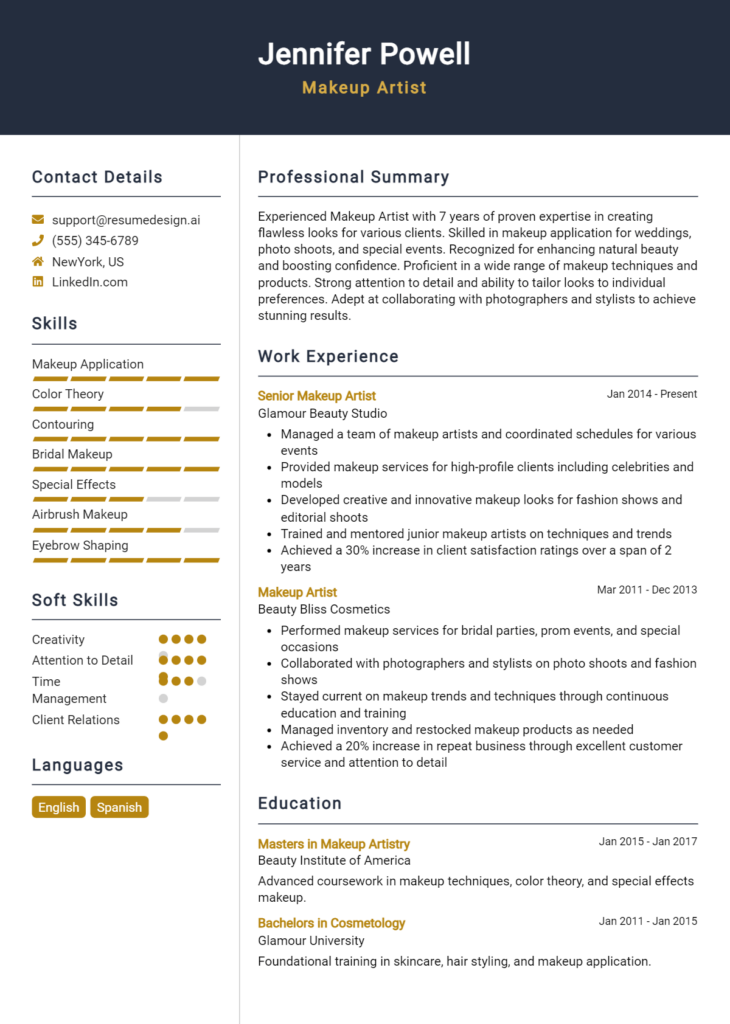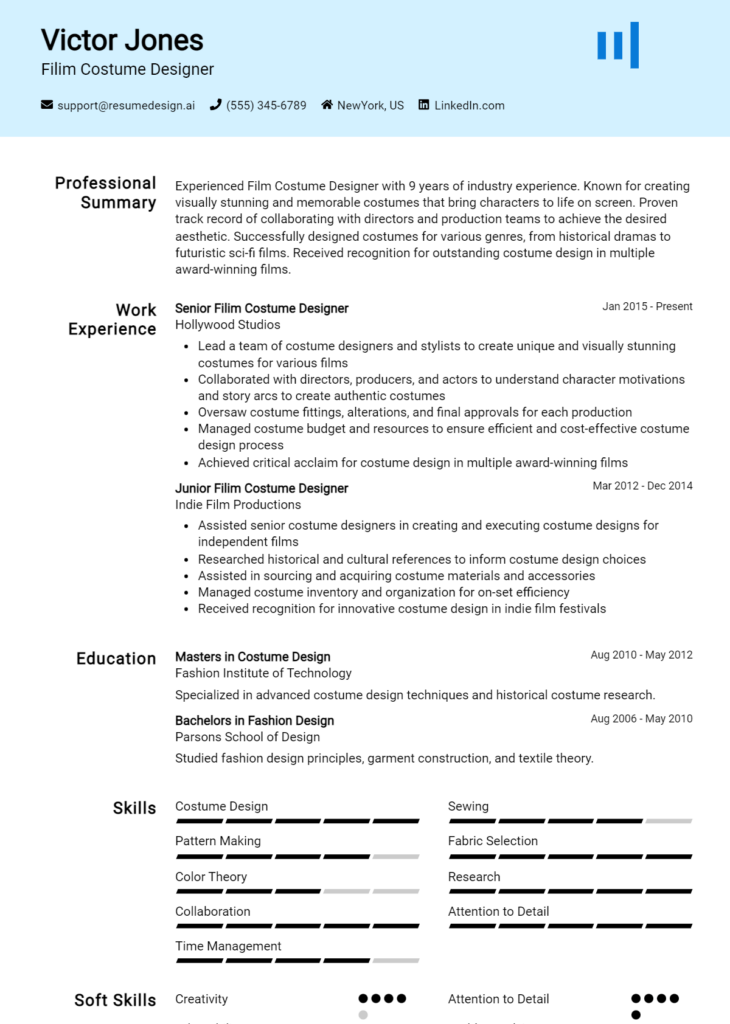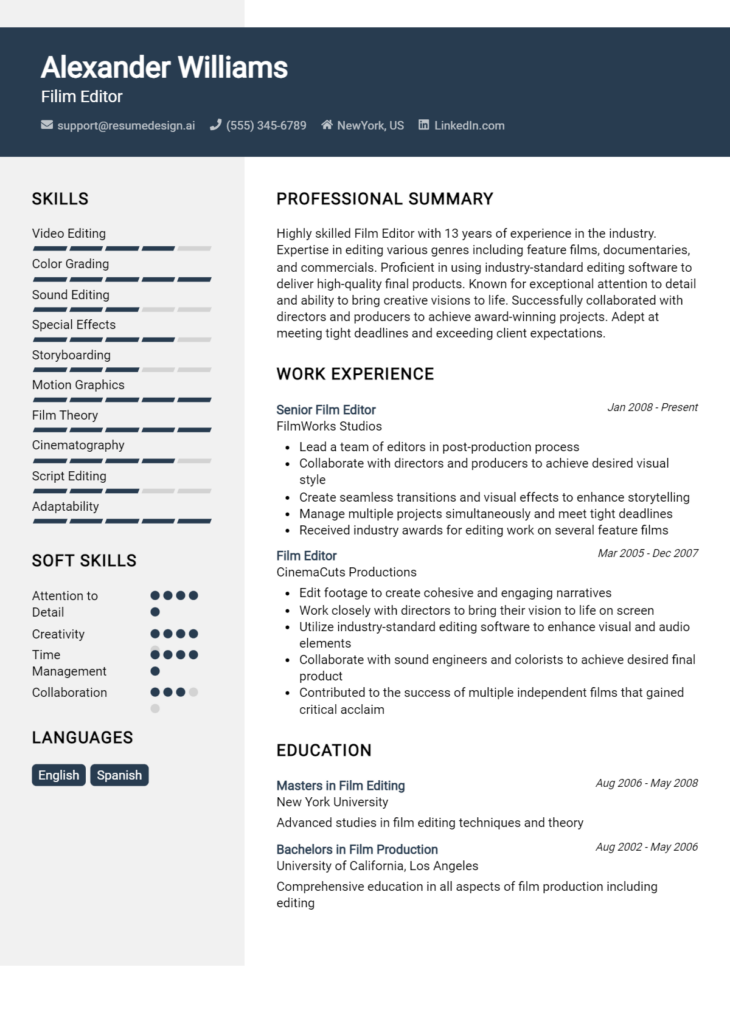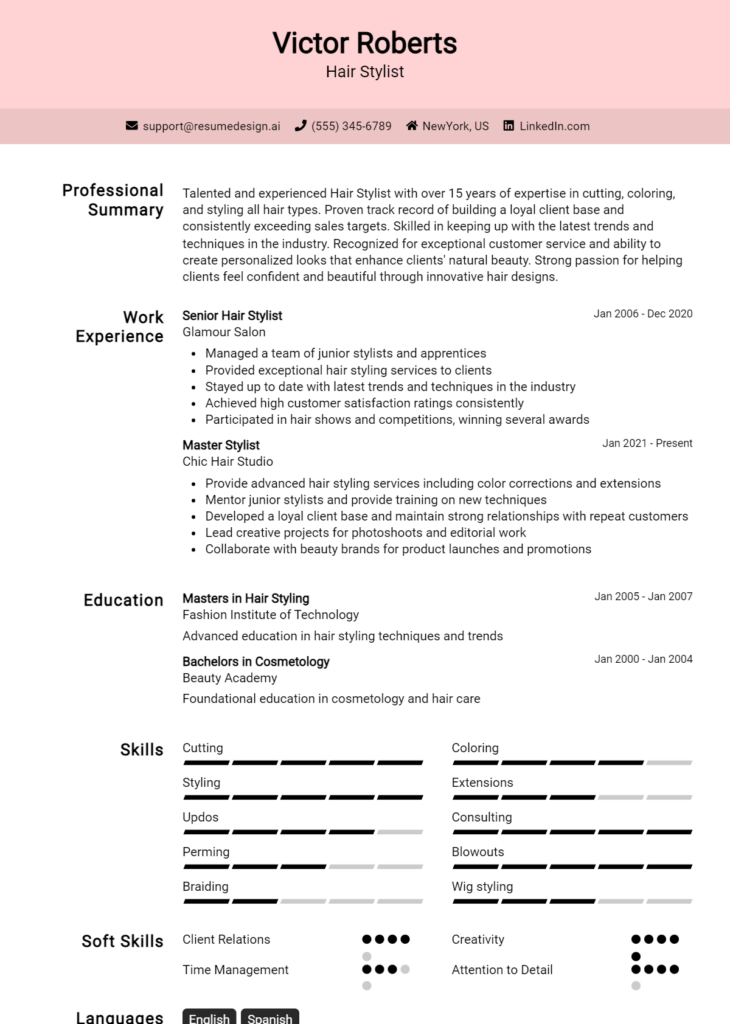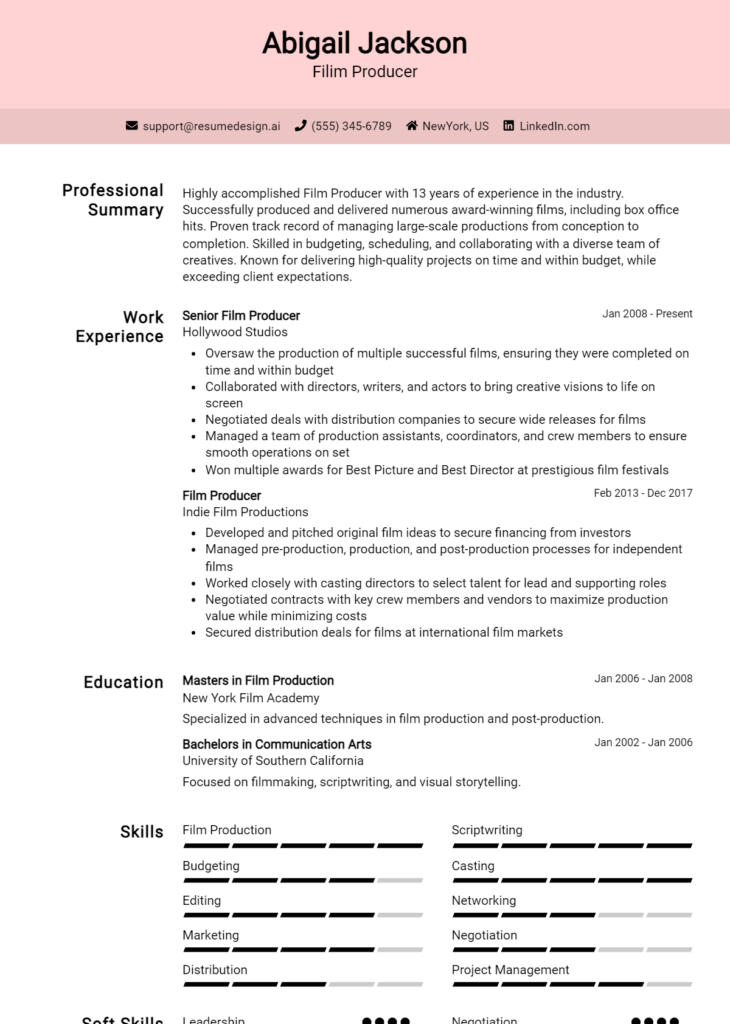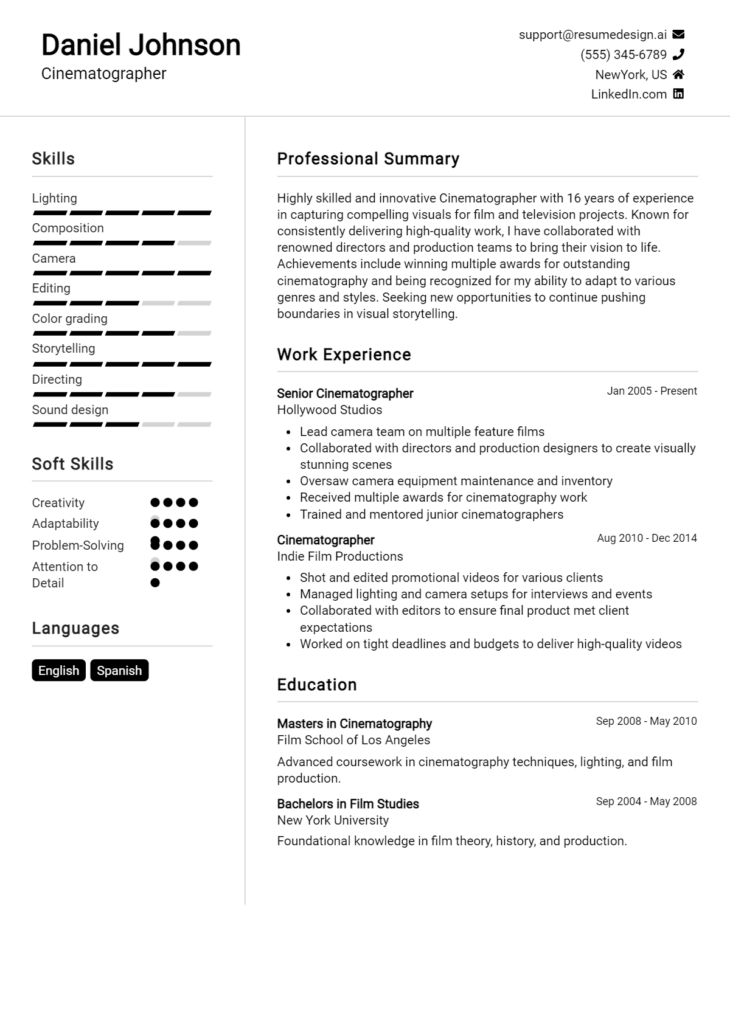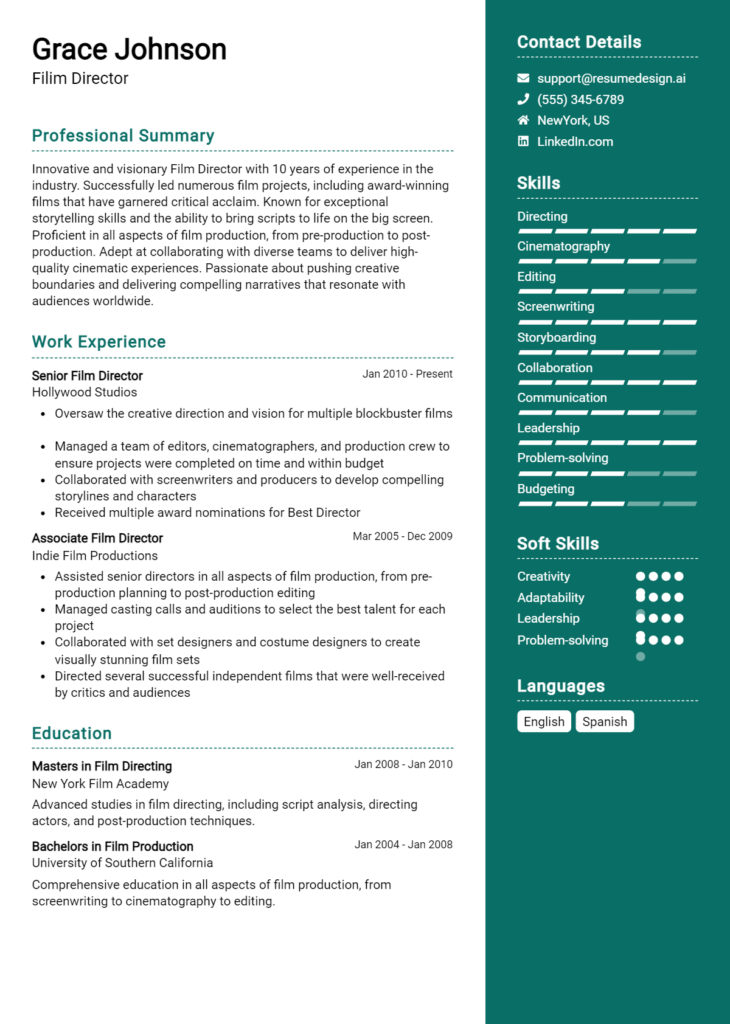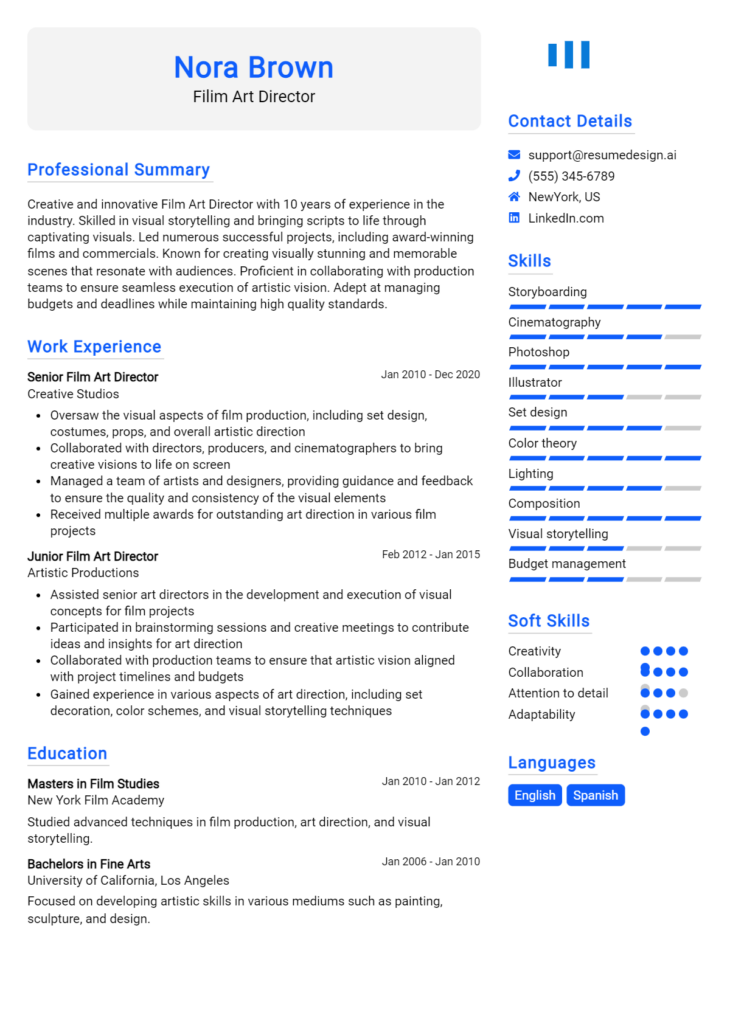Location Manager Core Responsibilities
A Location Manager plays a pivotal role in ensuring that filming or event locations meet creative and logistical needs. This professional must possess strong organizational skills, technical knowledge of site management, and exceptional problem-solving abilities to effectively coordinate between production teams, vendors, and local authorities. By bridging various departments, a Location Manager ensures seamless operations, aligning with the organization's overall goals. A well-crafted resume that highlights these competencies can significantly enhance career prospects in this dynamic field.
Common Responsibilities Listed on Location Manager Resume
- Scout and secure locations that meet production requirements.
- Negotiate contracts and permits with property owners and local authorities.
- Coordinate logistics for location access, including transportation and equipment.
- Manage on-site activities and oversee the setup and breakdown of locations.
- Collaborate with production teams to identify and resolve location-related challenges.
- Ensure compliance with safety regulations and local laws during shoots.
- Maintain communication with stakeholders to provide updates and address concerns.
- Document and track location expenses and budgets effectively.
- Develop backup plans for unpredictable circumstances or location changes.
- Conduct site surveys and prepare detailed reports for production teams.
- Build and maintain relationships with local vendors and service providers.
- Assist in post-production wrap-up activities related to location management.
High-Level Resume Tips for Location Manager Professionals
In the competitive world of location management, a well-crafted resume serves as a vital tool for securing job opportunities. For Location Manager professionals, your resume is often the first impression you make on a potential employer, and it’s essential to make it count. It needs to effectively reflect not only your skills and achievements but also your understanding of the industry and the specific demands of the role. This guide will provide practical and actionable resume tips specifically tailored for Location Manager professionals, helping you stand out in a crowded job market.
Top Resume Tips for Location Manager Professionals
- Tailor your resume to match the job description, emphasizing the skills and experience that align with the specific requirements of the position.
- Showcase relevant experience prominently, including specific projects or productions you have worked on, demonstrating your expertise in location scouting and management.
- Quantify your achievements with concrete numbers, such as the number of successful projects completed, budget sizes managed, or cost savings achieved through your efforts.
- Highlight industry-specific skills such as negotiation, logistical planning, and proficiency with location management software.
- Include a strong summary statement at the top of your resume that encapsulates your professional experience and unique value proposition as a Location Manager.
- Utilize action verbs to describe your responsibilities and achievements, making your experience sound dynamic and impactful.
- Incorporate any relevant certifications or training that may set you apart, such as safety training or project management certifications.
- Keep the design clean and professional, ensuring that your resume is easy to read and visually appealing, which can help maintain the reader's attention.
- Proofread for errors and clarity, as a polished resume devoid of typos reflects your attention to detail, a crucial trait for a successful Location Manager.
By implementing these tips, you can significantly increase your chances of landing a job in the Location Manager field. A well-structured and targeted resume will not only showcase your qualifications but also demonstrate your commitment to excellence, making you a more attractive candidate to potential employers.
Why Resume Headlines & Titles are Important for Location Manager
The role of a Location Manager is pivotal in the successful execution of film and television productions, as they are responsible for scouting, securing, and managing locations that align with the creative vision of the project. A well-crafted resume headline or title is integral to showcasing a candidate's qualifications and capturing the attention of hiring managers. A strong headline can serve as a powerful first impression, summarizing a candidate's expertise and unique value proposition in a concise, relevant manner. This immediate clarity helps hiring managers quickly gauge a candidate's fit for the role, making it essential for applicants to choose their words carefully and ensure their headlines reflect the specific job they are targeting.
Best Practices for Crafting Resume Headlines for Location Manager
- Keep it concise: Aim for no more than 10-15 words to maintain clarity.
- Be role-specific: Tailor your headline to reflect the Location Manager position directly.
- Highlight key skills: Incorporate essential skills that are relevant to the job, such as negotiation or site management.
- Use active language: Choose dynamic verbs that convey your achievements and capabilities.
- Quantify accomplishments: Whenever possible, include numbers or metrics to demonstrate your impact.
- Include industry keywords: Utilize terms commonly found in job descriptions to enhance relevance.
- Focus on value: Emphasize what you can bring to the role or how you've contributed in past positions.
- Avoid jargon: Use clear and straightforward language that is easily understood by hiring managers.
Example Resume Headlines for Location Manager
Strong Resume Headlines
“Results-Driven Location Manager with 10+ Years of Experience in Film Productions”
“Expert Location Scout Specializing in High-Profile Commercial and Film Projects”
“Creative Location Manager with Proven Track Record in Budget Management and Negotiation”
“Dynamic Location Manager Skilled in Coordinating Complex Site Logistics and Permits”
Weak Resume Headlines
“Location Manager Seeking Opportunities”
“Experienced Professional in the Industry”
Strong headlines are effective because they are specific, highlighting the candidate's experience and expertise in a way that resonates with the requirements of the Location Manager role. They convey confidence and clarity, making it easy for hiring managers to understand the candidate's strengths at a glance. In contrast, weak headlines fall short due to their vagueness and lack of direct relevance to the role. They fail to convey any substantive information or unique qualifications, which can make candidates seem less memorable or compelling in a competitive job market.
Writing an Exceptional Location Manager Resume Summary
A resume summary is a crucial component for a Location Manager as it serves as the first impression to hiring managers. An exceptional summary quickly captures their attention by highlighting key skills, relevant experience, and notable accomplishments that align with the demands of the role. This concise and impactful section is tailored specifically to the job being applied for, ensuring that it resonates with the employer's needs and sets the stage for the rest of the resume.
Best Practices for Writing a Location Manager Resume Summary
- Quantify Achievements: Use specific numbers to demonstrate your impact, such as budgets managed or projects completed.
- Focus on Skills: Highlight key skills that are directly relevant to location management, such as negotiation, site selection, and project management.
- Tailor the Summary: Customize your summary for each job application to reflect the specific requirements mentioned in the job description.
- Use Action Verbs: Start your sentences with strong action verbs that convey your proactive approach and leadership abilities.
- Showcase Relevant Experience: Briefly mention previous roles that relate closely to the responsibilities of a Location Manager.
- Keep it Concise: Aim for 3-5 sentences that pack a punch without overwhelming the reader with unnecessary detail.
- Highlight Soft Skills: Include interpersonal skills such as communication and teamwork, which are essential for effective location management.
- Be Authentic: Ensure your personality and professional ethos come through in your summary to create a connection with the hiring manager.
Example Location Manager Resume Summaries
Strong Resume Summaries
Results-driven Location Manager with over 8 years of experience overseeing multi-million dollar projects, achieving a 20% reduction in operational costs through strategic site selection and resource allocation. Proven track record of negotiating contracts that save up to 15% in vendor expenses while maintaining quality standards.
Dynamic Location Manager skilled in leading cross-functional teams to execute large-scale events and productions. Successfully managed logistics for over 50 site locations, resulting in a 30% increase in event attendance and a 25% boost in customer satisfaction ratings.
Accomplished Location Manager with expertise in project management and location scouting, recognized for enhancing site efficiency by 40% through innovative planning and process improvements. Proficient in utilizing industry-standard software to optimize location logistics and communication.
Weak Resume Summaries
Experienced Location Manager looking for new opportunities to manage locations and projects. I have worked in various capacities and am good at working with people.
Location Manager with several years of experience. I am adaptable and can handle multiple tasks at once while ensuring everything runs smoothly.
The strong resume summaries are effective because they provide specific, quantifiable results and relevant skills that directly relate to the role of a Location Manager. They highlight achievements and experience that demonstrate the candidate's ability to succeed in the position. In contrast, the weak summaries lack detail and specificity, making them generic and less compelling. They do not provide measurable outcomes or substantial insights into the candidate's qualifications, which can leave hiring managers unimpressed.
Work Experience Section for Location Manager Resume
The work experience section of a Location Manager's resume is pivotal in demonstrating the candidate's proficiency in managing various aspects of location selection and logistics within the film, television, or event production industries. This section not only highlights the candidate's technical skills, such as knowledge of location scouting and permitting processes, but also showcases their ability to lead and manage teams effectively to deliver high-quality productions. By quantifying achievements and aligning their experience with industry standards, candidates can present a compelling case for their qualifications and value to potential employers.
Best Practices for Location Manager Work Experience
- Highlight relevant technical skills, such as location scouting, budgeting, and negotiation.
- Quantify achievements by including metrics, such as budget savings or increases in efficiency.
- Emphasize collaboration with various departments, including production, art, and logistics teams.
- Use action verbs to convey leadership and initiative, such as "orchestrated," "managed," and "coordinated."
- Tailor descriptions to align with the specific requirements of each job application.
- Incorporate industry-standard terminology to demonstrate familiarity with production processes.
- Showcase problem-solving skills by detailing challenges faced and solutions implemented.
- Include awards or recognitions received for outstanding work in location management.
Example Work Experiences for Location Manager
Strong Experiences
- Successfully managed the logistics for a $5 million feature film, resulting in a 15% reduction in location costs through strategic negotiations and vendor partnerships.
- Coordinated with a team of 25 crew members to scout and secure over 30 unique filming locations, enhancing the visual storytelling of the project.
- Implemented a new location management software that improved tracking efficiency by 40%, streamlining communication across all departments.
- Led the location permitting process for a high-profile television series, achieving a 100% success rate in approvals within tight deadlines.
Weak Experiences
- Helped with location scouting for a few projects.
- Worked on a film set and assisted with various tasks.
- Managed some aspects of location logistics.
- Participated in team meetings related to location management.
The examples of strong experiences demonstrate clear, quantifiable outcomes and specific technical leadership while highlighting effective collaboration with teams. Each bullet point reflects a direct impact on project success, showcasing the candidate's ability to deliver results. In contrast, the weak experiences lack specificity and measurable achievements, making them less compelling and failing to provide a clear picture of the candidate's contributions and skills. This distinction emphasizes the importance of clarity and quantification in presenting one's work experience in a Location Manager resume.
Education and Certifications Section for Location Manager Resume
The education and certifications section of a Location Manager resume is crucial as it serves to demonstrate the candidate's academic qualifications, industry-relevant certifications, and commitment to continuous professional development. This section not only highlights the foundational knowledge gained through formal education but also emphasizes specialized training and certifications that are directly applicable to the role. By detailing relevant coursework and recognized credentials, candidates can significantly enhance their credibility and show potential employers that they possess the skills and knowledge necessary to excel as a Location Manager.
Best Practices for Location Manager Education and Certifications
- Include degrees that are relevant to film production, project management, or location scouting.
- List industry-recognized certifications such as Certified Film Location Manager (CFLM) or similar credentials.
- Provide details on relevant coursework that pertains to location management, logistics, or production planning.
- Highlight any specialized training in areas like contract negotiation, local regulations, or environmental compliance.
- Ensure that all educational entries are up to date and reflect the most recent accomplishments.
- Consider including workshops or seminars that showcase ongoing learning and industry engagement.
- Use clear and concise language to describe each educational experience and certification.
- Tailor the educational content to align with the specific requirements of the job description.
Example Education and Certifications for Location Manager
Strong Examples
- Bachelor of Arts in Film Production, University of Southern California, 2020
- Certified Film Location Manager (CFLM), Film Location Managers Association, 2022
- Coursework in Urban Planning and Site Management, New York University, 2021
- Advanced Training in Environmental Regulations for Filming, Green Filming Initiative, 2023
Weak Examples
- Associate Degree in General Studies, Community College, 2015
- Certification in Basic Microsoft Office, Online Learning Platform, 2019
- High School Diploma, Local High School, 2010
- Outdated Certification in Photography, Photography Institute, 2018
The examples provided illustrate strong qualifications that are directly relevant to the Location Manager role, showcasing degrees and certifications that align with the industry standards and job requirements. In contrast, the weak examples highlight educational experiences and certifications that lack relevance, such as general studies or outdated qualifications, which do not contribute to the candidate’s ability to perform effectively in a location management capacity. Strong examples demonstrate a commitment to the field and provide evidence of specialized knowledge, whereas weak examples may detract from the overall impression of the candidate’s qualifications.
Top Skills & Keywords for Location Manager Resume
As a Location Manager, possessing the right skills is essential to ensure the smooth execution of film, television, or commercial projects. A well-crafted resume that highlights both hard and soft skills can significantly improve your chances of landing an interview. The Location Manager plays a critical role in scouting, securing, and managing locations, requiring a blend of technical expertise and interpersonal abilities. By showcasing your skills effectively, you can demonstrate to potential employers that you have the necessary qualifications to handle the complexities of the role, from logistical planning to team collaboration. For more insights on the importance of skills in a resume, check out our dedicated page on skills.
Top Hard & Soft Skills for Location Manager
Soft Skills
- Strong communication skills
- Problem-solving abilities
- Team collaboration
- Negotiation skills
- Attention to detail
- Time management
- Flexibility and adaptability
- Leadership qualities
- Creativity in location selection
- Conflict resolution
Hard Skills
- Knowledge of location scouting techniques
- Familiarity with production processes
- Proficient in budgeting and cost estimation
- Understanding of local regulations and permits
- Experience with site management software
- Ability to conduct risk assessments
- Proficient in photography and videography
- Mapping and GPS navigation skills
- Proficient in project management tools
- Familiarity with contract management
Highlighting these skills in your resume will not only enhance your profile but also provide a comprehensive view of your capabilities as a Location Manager. Don't forget to focus on your work experience to further substantiate these skills with real-world applications.
Stand Out with a Winning Location Manager Cover Letter
Dear [Hiring Manager's Name],
I am writing to express my enthusiastic interest in the Location Manager position at [Company Name], as advertised on [Job Posting Source]. With a strong background in location scouting, logistical planning, and team management within the film and entertainment industry, I am confident in my ability to contribute effectively to your team and ensure that all location-related aspects of your productions run smoothly.
In my previous role at [Previous Company Name], I successfully managed over 30 diverse locations for various film and television projects, collaborating closely with directors, producers, and crew members to meet their specific needs. My keen eye for detail and strong negotiation skills allowed me to secure optimal locations while adhering to budgetary requirements. I have a proven track record of addressing challenges swiftly, whether it be acquiring permits or coordinating with local authorities, ensuring that productions remain on schedule and within budget.
Moreover, I am adept at building and maintaining relationships with local property owners and communities, which I believe is essential for fostering a positive working environment and ensuring seamless collaboration. My organizational skills and ability to multitask have been instrumental in overseeing logistics, from transportation and accommodations to ensuring that each location meets safety and regulatory standards. I am excited about the opportunity to bring my skills to [Company Name] and contribute to the success of your upcoming projects.
Thank you for considering my application. I am eager to discuss how my experience and passion for location management can be a valuable asset to your team. I look forward to the possibility of contributing to the innovative work at [Company Name] and am available at your earliest convenience for a conversation.
Sincerely,
[Your Name]
[Your Contact Information]
[Your LinkedIn Profile or Website]
Common Mistakes to Avoid in a Location Manager Resume
A well-crafted resume is crucial for a Location Manager seeking to land their next project, as it serves as the first impression to potential employers. However, many candidates fall into common pitfalls that can undermine their qualifications and experience. By avoiding these mistakes, you can present a polished and professional resume that effectively showcases your skills and expertise in managing film and production locations. Here are some common mistakes to avoid:
Generic Objective Statement: Using a vague or generic objective statement can make your resume blend in with others. Tailor your objective to reflect your specific goals and what you bring to the role of a Location Manager.
Lack of Quantifiable Achievements: Failing to include measurable accomplishments can make your experience seem less impressive. Use numbers and metrics to highlight your successes, such as the number of projects managed or budget savings achieved.
Inadequate Detail on Location Scouting: Omitting specific examples of locations you've scouted or managed can leave employers wanting more. Detail the types of locations you've worked with, including unique challenges and how you overcame them.
Ignoring Industry Terminology: Using vague language instead of industry-specific terminology can make your resume less credible. Incorporate relevant terms like "scouting," "permit acquisition," and "logistics management" to demonstrate your familiarity with the field.
Poor Formatting and Organization: A cluttered or unorganized resume can be difficult to read, causing hiring managers to overlook important information. Use clear headings, bullet points, and consistent formatting to enhance readability.
Neglecting to Highlight Collaboration Skills: Focusing solely on individual accomplishments without mentioning teamwork can diminish your appeal. Emphasize your ability to collaborate with directors, producers, and other departments to ensure a seamless production.
Using Passive Language: Employing passive language can make your contributions seem less impactful. Use active verbs to convey your role and achievements more dynamically, such as "led," "coordinated," or "negotiated."
Overlooking Continuing Education and Training: Not mentioning relevant certifications or training can make your resume seem outdated. Include any recent workshops, courses, or certifications that demonstrate your commitment to professional growth in the field.
Conclusion
As a Location Manager, your role is crucial in ensuring that film and television productions run smoothly in their designated locations. You are responsible for scouting locations, negotiating contracts, managing budgets, and coordinating with various departments to ensure that everything aligns with the creative vision of the project. Your skills in communication, problem-solving, and organization are essential in navigating the complexities of location management.
In addition to your core responsibilities, you must also be adaptable and resourceful, as each location presents unique challenges and opportunities. Your ability to build relationships with property owners, local authorities, and vendors will greatly enhance the efficiency of your projects. Moreover, an understanding of local regulations and permits is vital for compliance and to avoid any legal issues.
As you reflect on your career as a Location Manager, it’s important to ensure that your resume effectively showcases your skills and experiences. A well-crafted resume will help you stand out in a competitive job market. We encourage you to take the time to review your Location Manager Resume to ensure it highlights your strengths and achievements.
To assist you in this process, consider utilizing available resources. Explore our resume templates to find a layout that suits your style. Use our resume builder for a user-friendly experience in crafting your resume from scratch. If you’re looking for inspiration, check out our resume examples to see how others in your field have successfully presented their qualifications. Additionally, don’t forget to enhance your job application with a polished cover letter; our cover letter templates can guide you in creating a compelling narrative that complements your resume.
Take the next step in your career by refining your resume today!

